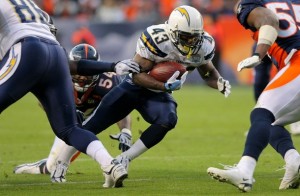Posted Mon Nov 23rd by Monty

Darren Sproles #43 of the San Diego Chargers rushes against the Denver Broncos down during NFL action at Invesco Field at Mile High on November 22, 2009 in Denver, Colorado. The Chargers defeated the Broncos 32-3. (Doug Pensinger/Getty Images)
One of the largest differences between the two Chargers games this season was the amount of pressure the Broncos were able to put on quarterback Philip Rivers.
In October, Mike Nolan‘s defense tallied five sacks against Rivers, a career high for the fourth-year starting quarterback. They were constantly in the quarterback’s face through a well-utilized variety of blitz packages.
In the loss Sunday, the Broncos didn’t register a single sack, and they hardly mounted any pressure or quarterback hits, either. The number of blitzes called, or lack thereof, had a lot to do with it.
“Well, I think in that (October) game, obviously they brought a lot of blitzes,” Philip Rivers said after the game. “It was a combination of a lot of things. In this game, and as we have the whole year, especially these last four weeks, the guys up front have been unbelievable and protective. In this game they did not blitz near as much so they kind of surprised us.”
“They didn’t bring as much as they brought in the early game.”
It’s true that the protection schemes were certainly better for San Diego, so credit them for that, but the fact that Nolan and head coach Josh McDaniels went away from what was so successful in October is disconcerting. What happened to the blitz?
Simply, with a big, early lead, the Chargers were able to run it right out of Denver.
Take a look at the difference in passing yards between the two games. Rivers actually threw for more yards and a higher average in October, with shoddy protection while the Broncos were sacking him left and right. He passed for 273 yards and an 8.3 average in Week 6 compared to only 145 yards and a 6.6 average in Week 11. In both games, he threw for one touchdown and zero interceptions.
The difference in the scoreboard more closely reflects the rushing totals between the two games. In October, the Chargers rushed for 73 yards. On Sunday, they grounded out a whopping 203.
Early mistakes cost Broncos late
The context of how the two games played out — particularly in the early goings — dictated the defense’s ability to dial up those blitz packages. In October, the Broncos were competitive early. They didn’t fall behind 13-0 by the second quarter. The teams traded game leads back and forth in the early goings, and the Broncos were able to get after Rivers with a balanced offense and defense.
On Sunday, the Chargers made the Broncos one-dimensional. They couldn’t dial up blitzes in fear of getting gashed in the running game, and they couldn’t stay disciplined in their own ground game offensively despite some big numbers by their running backs.
As a result, the Chargers were able to maintain their early lead with their best running performance of the season. Much of the 203 rushing yards tallied were in the fourth quarter, while many of the sacks and pressure the Broncos enjoyed in October occurred in that match’s fourth quarter.
The dynamic on how the games played out made all the difference.
“I think any time that you get in the red zone and turn the ball over twice the first few times you’re down there that certainly that doesn’t lend itself to winning too many games and scoring too many points,” Josh McDaniels said. “We’ve got to do better earlier in the game so that we can stay balanced, run the ball effectively and throw the ball effectively at the same time without giving away what we have to do. As the game wore on today we’re out there with a two tight end set in their nickel package because they know we have to throw it.”
Still, Nolan’s defense allowed the Chargers to march down the field several times to attain that 13-0 lead. San Diego scored on each of their first three possessions (touchdown, field goal, field goal), and the Broncos defense didn’t force a punt until late in the second quarter. Rivers was able to convert several third downs on those drives, particularly in Denver’s red zone. Had Nolan blitzed then, especially on those third downs, it could have made the difference in the early goings that might have changed the game’s tempo late.
Instead, the Broncos stayed conservative, and Rivers made them pay.
Not that getting after Rivers has ever been easy. As Jeff Legwold points out, October’s sack-fest was the exception, not the rule. Rivers is 3-1 in his four starts in Denver, having only been sacked twice in those games.
It all points to the fact that the Broncos aren’t built to come from behind. They’ve been exposed as a team that can’t stop the run in the second half, and three teams have taken the Baltimore Ravens‘ Week 8 blueprint and run with it in that regard.
Their limitations at quarterback reared its ugly head against a Chargers defense that was able to prepare for only the pass, and this defense is at its best when it can get after the quarterback. It’s best on third and longs. As Rivers completed pass after pass on second downs, the Chargers neutralized Denver’s defensive advantage.
“We’ve got to do things well, early in the game so we can stay balanced and do the things that got us success in the beginning of the season,” McDaniels said. “Obviously in the last four weeks we haven’t done that.”

 Subscribe via email
Subscribe via email
Published on 11/23/2009 at Mon Nov 23 10:25.
Tagged: 2009 Season,Baltimore Ravens,Denver Broncos,Mike Nolan,Philip Rivers,San Diego Chargers,Top Stories.